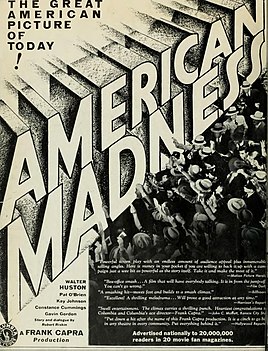American Madness
| American Madness | |
|---|---|
 Film poster | |
| Directed by | Frank Capra |
| Written by | Robert Riskin |
| Produced by | Frank Capra Harry Cohn |
| Starring | Walter Huston |
| Cinematography | Joseph Walker |
| Edited by | Maurice Wright |
| Music by | Mischa Bakaleinikoff (uncredited) Karl Hajos (uncredited) |
Production company | |
Release date |
|
Running time | 75 min |
| Country | United States |
| Language | English |
American Madness is a 1932 American pre-Code film directed by Frank Capra and starring Walter Huston as a New York banker embroiled in scandal.
Plot[]
At the Union National Bank, the directors are concerned because they think the bank's president, Tom Dickson (Walter Huston), has loaned too much money to people who are bad risks during this Great Depression era. They threaten to replace him. Dickson argues that he loans to people he personally knows are good risks and that none of them has defaulted, and that loaning the money keeps it circulating, without which the Depression would get even worse. He refuses to resign.
His wife Phyllis (Kay Johnson) drops by. She is planning a special date for their anniversary that night, but he has forgotten it and made business plans. He promises to go out with her the next night, but promptly arranges another business meeting then.
Three gangsters led by Dude Finlay (Robert Ellis) enter the office of chief cashier Cyril Cluett (Gavin Gordon) to intimidate him. He owes them $50,000 in gambling debts, and they promise not to hurt him if he helps them rob the bank that night. They advise him to arrange an alibi for midnight, when the robbery will be. Seeing Phyllis, he claims to have always been in love with her and asks to go out with him that night. She decides to have some harmless fun while Tom is unavailable, and agrees to do it. However, they are seen by Matt Brown (Pat O'Brien), who assumes the worst about Dickson's marriage.
Cluett resets the vault's time lock before leaving to meet Phyllis. They go to a play, then to his apartment; but Brown is there waiting for them, hoping to break up their affair. Meanwhile at the bank, the gang steals $100,000, but they also murder a guard who sees them.
The next day, rumors about the amount stolen become wildly exaggerated and cause a run on the bank. Dickson tries frantically to arrange emergency money to meet the withdrawals but cannot, and the board will not help, preferring to force him out. The bank still has enough resources to pay all depositors eventually, but its reputation for safety will be gone if they cannot withdraw money now.

Meanwhile, the police suspect Brown, who will only say he was at home with a married woman he will not name. Eventually they hear about Cluett being seen with Dude Finlay and turn their suspicions to him. Brown is cleared, but as they talk about alibis, he blurts out Phyllis's name in Dickson's presence. Dickson, too, believes the worst about his marriage. He becomes depressed and agrees to resign his job.
As the bank runs out of cash, Dickson's subordinates have an idea. They call on the people Tom Dickson has helped with loans in the past, to come in and visibly deposit all the money they can afford. They also call Phyllis, who reassures Dickson of her love. When the board sees the loyal depositors, they rally around to support Dickson, arranging immediate deliveries of money themselves. The bank is saved; Dickson recovers his positive attitude and keeps his job.
Finally Tom Dickson gives Matt Brown the promotion he has been hoping for, and "orders" him to marry his girlfriend, Dickson's own secretary Helen (Constance Cummings). He then asks Helen to arrange a luxurious sea voyage—for himself and Phyllis.
Cast[]
- Walter Huston as Thomas A. Dickson
- Pat O'Brien as Matt
- Kay Johnson as Mrs Phyllis Dickson
- Constance Cummings as Helen
- Gavin Gordon as Cyril Cluett
- Arthur Hoyt as Ives
- Robert Emmett O'Connor as Inspector
Production[]
American Madness marked the first in a series of legendary collaborations between Capra and Robert Riskin. It was also Riskin's first original screenplay.[1]
The film contains one zoom, which is notable for its use of the then new three element Cooke-Varo lens.[2]
References[]
External links[]
- American Madness at IMDb
- Six Screen Plays by Robert Riskin, Edited and Introduced by Pat McGilligan, Berkeley: University of California Press, c1997 1997 - Free Online - UC Press E-Books Collection
- 1932 films
- English-language films
- 1932 drama films
- American drama films
- American films
- American black-and-white films
- Columbia Pictures films
- Films directed by Frank Capra
- Films set in New York City
- Films with screenplays by Robert Riskin
- 1930s drama film stubs